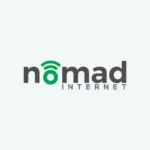Nomad Internet vs. CenturyLink: The Versatile Backpack VS. the Traditional Briefcase of Connectivity
Choosing the appropriate Internet Service Provider (ISP) for internet connectivity is similar to picking the proper tool for the job. Imagine your internet service as the bag you carry every day. Do you want a versatile backpack that adapts to any adventure, offering flexibility and freedom? Or do you prefer a reliable traditional briefcase more suited to specific paths? In this comparison, Nomad Internet is the versatile backpack, ready for any challenge, while CenturyLink is the traditional briefcase, sturdy but constrained by its design.

Content
Nomad Internet: The Versatile Backpack
This premise of Nomad Internet implies frequent changes in location and shift, as well as flexibility and versatility among its users concerning obtaining Internet services. It employs cellular networks to connect to the internet whenever there is a signal and anywhere, which makes it suitable for nomadic clients, workers who work from home, or rural residents. They said they had many types of data plans and did not have long-term contracts; therefore, Nomad Internetallowed the users to relocate their connection as they deemed fit.
CenturyLink: The Traditional Briefcase
CenturyLink is one of the largest internet service providers that offer the customer DSL & fiber optic internet services. It is slow but stable, inexpensive, and can access rural and urban areas; thus, the user will have a proper connection if they stick to the conventional path. However, like a briefcase, it is more rigid and less adaptable to the dynamic needs of today’s internet users.
Why Nomad Internet Stands Out Over CenturyLink
1. Mobility and Flexibility: Ready for Any Adventure
Nomad Internet comes with a lot of flexibility; one can log onto the internet from anywhere, provided they are in the jurisdiction of the cellular networks. Just as you need a bag that can hold your belongings and also act as a place to rest items on your back, so it is also ideal for those who always need to be connected to the internet but are somehow mobile, including travelers or those who move around in RVs, or those living in the countryside. Some are location- or point-focused, mainly offering a service at a specific location where installation is made. Therefore, they are not very helpful to an organization that may have fluctuating connectivity needs from time to time.
2. No Long-Term Contracts: Freedom to Adapt
Nomad Internet offers month-to-month plans without the constraints of long-term contracts, allowing users to adjust their plans as needed. This adaptability is crucial for those whose internet needs may change over time. CenturyLink often requires contracts, which can bind users to specific terms and make it difficult to switch providers without penalties.
3. Easy Setup: Instant Connectivity
Nomad Internet offers Internet Services that are not restricted to annual contracts like competitors in this industry, allowing customers to switch their plans. This makes it appropriate for those people who require more or less internet than others at some time. It is the case with CenturyLink, where contracts are signed between the company and the consumers, the service conditions offered are fixed, and they must pay some amount to shift to another service provider quickly.
4. Coverage in Remote Areas: Go Off the Beaten Path
Concerning the areas that Nomad Internet can cover, its use of cellular networks allows it to have extensions to the under-served and un-served zones, unlike other ISPs such as Century Link. This capability is precious for people living in regions with limited internet connections, who need a stable internet connection no matter where they are. This means that compared to the urban and suburban regions, CenturyLink’s network ranges are comparatively narrow in rural areas.
5. Unlimited Data: No Boundaries on Usage
Nomad Internet is proud to provide consumers with great value and unlimited data plans that are never throttled. This freedom is desirable, especially for the users who depend on the internet to work, study, and have fun. CenturyLink’s plans may include data limits, which can restrict heavy users and impact their online activities.
CenturyLink: The Stability of a Traditional Approach
1. Consistent Speeds: The Reliable Path
CenturyLink provides consistent speeds, particularly in areas with fiber-optic availability. This reliability makes it a solid choice for users with stable internet needs, such as streaming and online work. However, its DSL service may offer slower speeds than fiber, limiting performance in some areas.
2. Established Infrastructure: The Trusted Brand
CenturyLink is a well-established brand with an extensive infrastructure, providing a sense of reliability for users in covered areas. This reputation can be comforting for those who prefer a known entity for their internet service.
3. Competitive Pricing: Value for Stability
Continuing with the pricing policy, it can be stated that CenturyLink provides relatively reasonable prices to the market, mainly for the company’s fiber-optic internet service, which might be a valuable opportunity in certain regions. However, the costs of the contracts and possible penalties in case of contract termination can be disadvantageous.
The Limitations of CenturyLink’s Traditional Approach
1. Fixed Location Service: Bound to One Place
The service has to be installed at a particular location, which restricts mobility in case a user needs internet in more than one place, unlike the case with wireless modems. One of these disadvantages is that it is a fixed approach that might be a problem for a person with an active/suspenseful lifestyle or who travels often.
2. Contractual Obligations: The Restrictive Path
CenturyLink often requires long-term contracts, binding users to specific terms and conditions. These contracts can limit the ability to switch providers or adjust plans without incurring penalties.
3. Coverage Gaps: Limited Reach in Rural Areas
CenturyLink’s coverage primarily focuses on urban and suburban areas, leaving rural users limited options. This lack of coverage can significantly disadvantage those living in remote locations.
Conclusion: Choose the Versatile Freedom of Nomad Internet
Some questions one needs to ask themselves when selecting an ISP should be answered by reflecting on one’s life, work, and leisure activities. Thus, Nomad Internet acts as the universal backpack of connectivity: Quick, easy, and especially not tied to a contract, unlike most companies.
While CenturyLink provides a reliable option for those in covered areas, its limitations in flexibility and coverage make it less appealing for users seeking a dynamic and adaptable internet experience. Nomad Internet is ideal for those ready to embrace a more flexible and unrestricted internet solution. Enjoy the freedom to connect wherever you are and experience an internet service that aligns with your lifestyle and aspirations, like a backpack ready for any adventure in the digital world.

Hello, I’m Rex Crist. My goal is to show that traveling can be affordable and fun! I love to explore new places and experience different cultures. I also like iced coffee, iced tea, and ice cream (in that order).











